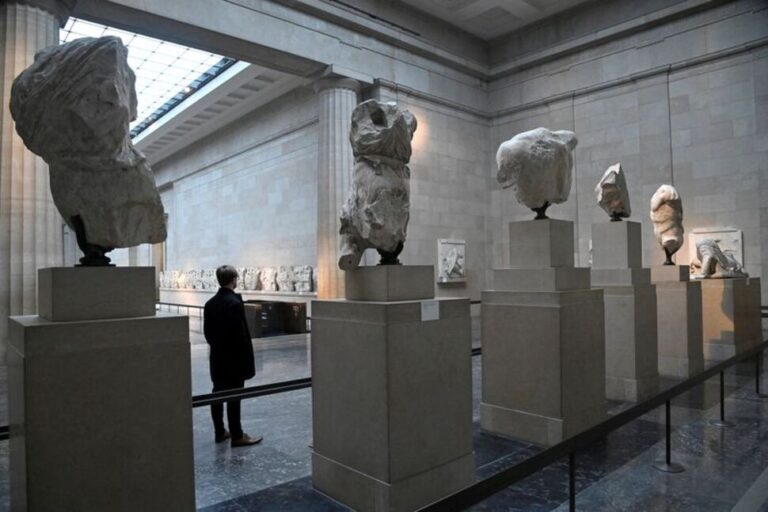By Andrew MacAskill, Alistair Smout and Renee Maltezou
LONDON/ATHENS (Reuters) – A dispute between Britain and Greece over ownership of the Parthenon sculptures, known as the Elgin Marbles, escalated on Tuesday, with both sides rejecting each other’s responsibility for the cancellation of a planned meeting between their two leaders.
Prime Minister Rishi Sunak canceled Tuesday’s meeting with his Greek counterpart Kyriakos Mitsotakis after his office said both sides had previously agreed it should not be used as a public platform “for relaunching questions that have been settled for a long time.
“It’s simply that if assurances are given and they are not met, there will be consequences,” Sunak’s spokesman told reporters.
A senior Greek government official, speaking on condition of anonymity, dismissed the statement as “inaccurate.”
Greece has repeatedly asked the British Museum to permanently return the 2,500-year-old sculptures that British diplomat Lord Elgin removed from the Parthenon temple in 1806, at a time when Greece was under Ottoman Turkish rule.
About half of the 160-meter frieze that adorned the temple is in London, while a further 50 meters are in the Acropolis Museum in Athens, whose top-floor layout mimics the Parthenon.
Appearing on the BBC this weekend, Mitsotakis compared the separation of the sculptures to cutting the Mona Lisa in two, a characterization rejected by the British government.
“The prime minister did not say anything new. Greece’s positions on the issue of the Parthenon sculptures are known,” said Aristotelia Peloni, Mitsotakis’ international policy adviser. “Disagreeing on some issues doesn’t mean we can’t talk.”
Britain and Greece said the dispute undermined the ability to discuss global issues, including the wars in Gaza and Ukraine and the climate crisis. The two leaders also reportedly discussed a migration action plan between the United Kingdom and Greece.
Greek government spokesman Pavlos Marinakis said the cancellation was unprecedented and disrespectful, but added that Athens did not want to let the row with Sunak spoil good relations between the two countries.
Later Tuesday, British Foreign Secretary David Cameron and his Greek counterpart George Gerapetritis met on the sidelines of a meeting of NATO ministers in Brussels, Greek diplomats said.
“Both ministers agreed that it was necessary to cooperate to safeguard bilateral relations between Greece and the United Kingdom and address common challenges,” one of the diplomats said, adding that the Greek minister noted a disagreement of principle on the question of the Parthenon sculptures.
Sunak’s decision to cancel the meeting was also criticized by some British opposition parties and a campaign group backed by British politicians from different parties who want to resolve the issue.
Greece does not recognize the British Museum as the owner of the sculptures.
The group, the Parthenon Project, has proposed a deal that would see the sculptures reunited in Athens – without Britain and Greece needing to agree on their ownership.
Ed Vaizey, a former Conservative culture minister who advises the group, said Sunak’s action was a “twist” given Britain’s previous position that solving the problem was a matter for the British Museum itself. even.
“The prime minister put himself front and center in a row where he didn’t really need to come front and center,” Vaizey told Sky News. “I don’t think the Prime Minister really needed to intervene in this way and it hasn’t particularly improved our relations with Greece.”
The British government has long cited a law that prevents the British Museum from getting rid of objects from its collection in most cases.
Asked if the government was concerned that other countries could also seek the return of the items if a deal was reached to return the marbles, Sunak’s spokesman said: “We think that’s potentially a slippery slope, and it’s not something we would support.”
(Additional reporting by Angeliki Koutantou; editing by Bernadette Baum, William Maclean and Sharon Singleton)
Copyright 2023 Thomson Reuters.


